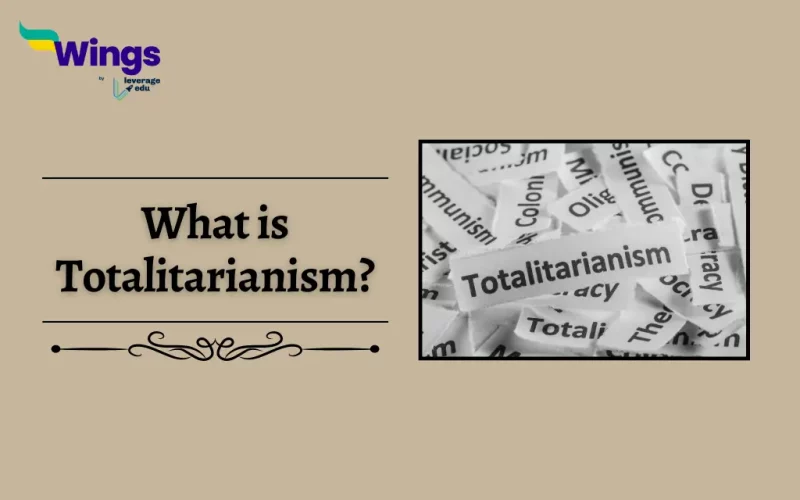Totalitarianism is a concept that has echoed throughout history, leaving an indelible mark on societies, governments, and people. Furthermore, the essence of Totalitarianism is an all-encompassing state authority that exerts extreme control over every aspect of public and private life. Let us get to know more about Totalitarianism and all that it entails.
Table of Contents
Totalitarianism in Simple Terms
Simply put, it is a form of government where the state controls every aspect of society. Moreover, Totalitarianism is like a spider web, with a central authority at the centre controlling all the threads and reaching out into every area of life. Additionally, no area of society is beyond its reach.
What is Totalitarianism?
There is more to Totalitarianism than autocracy. Totalitarianism is an ideology-driven system that aims to control politics, the economy, culture, education, and even citizens’ thoughts and beliefs. In a Totalitarian state, dissent is suppressed, censorship is imposed, and propaganda is used to shape public opinion.
Also Read: What is Fascism: Defination, History, Significance
What is a Totalitarian Government?
A Totalitarian Government in which one party holds ultimate power, usually without any checks or balances.
- People have limited freedoms, and the state maintains its power through repression, surveillance, and fear.
- In addition, it is common for Totalitarian governments to use secret police forces to quell opposition.
Also Read: What is Capitalism: Defination, History, Significance
Various Definitions of Totalitarianism
Furthermore, here are some of the definitions of Totalitarianism:
- Hannah Arendt: “Totalitarianism is not primarily interested in the physical annihilation of men, but in the destruction of the human realm as such, the realm where men, without being masters or servants, can live together and act upon the world.” (The Origins of Totalitarianism)
- Raymond Aron: “Totalitarianism is the political equivalent of religious or cosmic monism. It postulates a unique truth, of which the Party or the Leader is the sole custodian, and which must be imposed on all domains of individual and collective life.” (Democracy and Totalitarianism)
- Carl Schmitt: “Totalitarianism is a political form…characterized by the denial of all distinctions between state and society, public and private, economics and politics.” (The Concept of the Political)
- Jean-Paul Sartre: “Totalitarianism is a political system in which a group…claims not only to possess the truth but also to exhaust it.” (Critique of Dialectical Reason)
- John Lukacs: “Totalitarianism is the most aggressive modern form of the ancient dream of Utopia.” (A History of the Cold War)
Also Read: What Is An Authoritarian Government?
What are the Characteristics of Totalitarianism?
To recognize a Totalitarian government, it is essential to understand its defining characteristics, which are:
1. Centralized Authority: One party or leader has all the power.
2. Suppression of Dissent: Political or ideological opposition is suppressed.
3. Propaganda and Censorship: Public perception is manipulated with information.
4. Control of Economy: States often influence the economy a lot.
5. State Surveillance: Citizens are subject to constant monitoring by the government.
6. Limited Civil Liberties: Freedom of expression and assembly are restricted.
7. Personality Cult: Leaders of totalitarian regimes are often glorified and exalted.
Also Read – What is Communism? Find Out History, Beliefs, Pros and Cons
Famous Leaders of Totalitarian Governments
Throughout history, many leaders have represented Totalitarianism. Among them are Joseph Stalin of the Soviet Union, Adolf Hitler of Nazi Germany, Mao Zedong of China, and Kim Jong-un of North Korea. Moreover, they imposed Totalitarian regimes that caused a lot of suffering and changed history forever.




Also Read: What is Anarchism: Defination, History, Significance
Significance of Totalitarian Governments
The dangers of unchecked state power are starkly illustrated by Totalitarianism. The lesson is clear – giving too much power to a single entity is like giving a child too much candy; the results can be catastrophic. We need to protect democracy, protect individual rights, and promote open societies.
Overall, Totalitarianism refers to a range of historical and contemporary governments characterized by extreme control, repression, and ideological fervour. Furthermore, recognizing its defining features and studying its historical significance is essential in our ongoing commitment to upholding democratic values and human rights.
Related Blogs
Lastly, we hope you liked our blog and gained an understanding of What is Totalitarianism. Moreover, you may even read more blogs and empower yourself with knowledge regarding Civics and Polity!
 One app for all your study abroad needs
One app for all your study abroad needs













